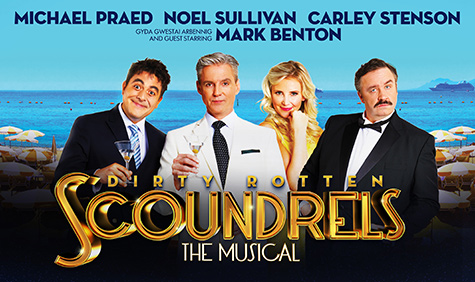
It’s well and truly the season in Beaumont-Sur-Mer on the French Riviera, and the game is on for suave con man Lawrence Jameson who makes his living by conning rich women out of their money. This season however things are not as usual, with the arrival of one Freddy Benson, a young American upstart who threatens Jameson’s lifestyle. After an attempt at working together a bet is made to win a ‘prize’ that would see the other leave town for good.
It is never easy adapting a classic film into a musical. The score created by David Yazbek and Jeffrey Lane is very dynamic and has some hilariously comical lyrics that have the audience in stitches for the majority of the show. David Yazbek’s songs give the show a very classy feel and then combined with Jeffrey Lane’s brilliant comedic script leaves the audience laughing and wanting more.
Key to the success of Dirty Rotten Scoundrels Musical is the onstage relationship between Lawrence Jameson played by Michael Praed and Freddy Benson played by Noel Sullivan. There is an instant chemistry between these two actors, leaving the audience having just as much enjoyment and fun as them on stage. This too is shown when watching Michael Praed and Noel Sullivan carry out their elaborate cons in varying comical numbers such as All About Ruprecht and Ruffhousin’ Mit Shuffhausen. Both Praed and Sullivan have faultless comic timing and are also blessed with incredible voices that really work well with David Yazbek’s score.
Phoebe Coupe is every bit the equal of the two confident con men Jameson and Benson. As Christine Colgate she seems the perfect target but this charming young lady hides a great secret. Phoebe Coupe has a great voice and sparkles as she gets taken in by Jameson and Benson and their elaborate scheme.
Geraldine Fitzgerald plays Muriel Eubanks, a classy dame who travels around the world looking for love and living life to the full. From her first appearance, you can’t help but love Muriel, she has a feeling that she knows she’s being conned but yet she’s still here.
The casting of Mark Benton as Andre Thibault, Lawrence Jameson’s right hand man is brilliant and has created far more of a comic interpretation. His scenes in act two with Geraldine Fitzgerald’s Muriel had the audience crying out for more and had a certain element of Strictly Come Dancing about it. Mark Benton has a real talent for comic timing and he deploys it with superb effect at key moments throughout the show.
One cannot write a review of this magical show without of course mentioning the very hardworking ensemble that provides the cherry on top of the cake for this musical. With the many characters portrayed from hotel staff to sailors the ensemble gives a feeling of overwhelming talent with their ranges simply impeccable.
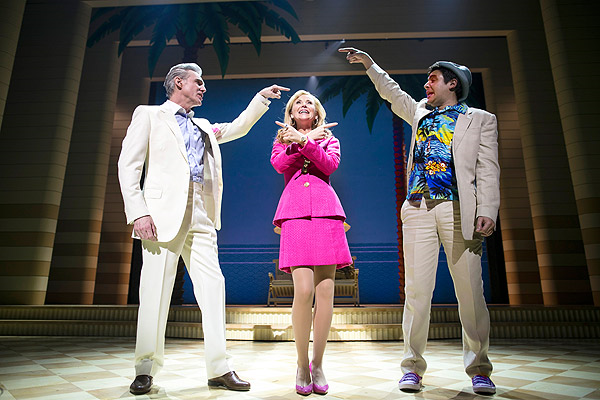
Jerry Mitchell, as Director and Choreographer creates a truly wonderful atmosphere with the slick staging and equal parts of hilarity. Matthew Brind has provided the show with boundless orchestrations and arrangements and under the baton of Musical Director Ben Van Tienen, the show is jammed packed with life and incredible energy that spreads to the audience leaving their toes well and truly tapping. The score is a joy to listen to something I could do every evening.
I believe a special mention should go out to Peter McKintosh who has provided a stunning set for Dirty Rotten Scoundrels. Scene changes are effortlessly transformed with style and always complimenting what is happening on stage and never detracting from it. His costumes are to die for with an abundance of panache and a suitable dose of classiness. Even though Freddy doesn’t have the best dress sense it adds and compliments his character.
Dirty Rotten Scoundrels The Musical is a wonderful evening at the theatre. Its sheer fun and you would be hard pushed to find anybody who could walk out of the theatre without having had a great evening with a great deal of laughs. This show really does “Give Them What They Want” and offers “Great Big Stuff”. This posse of classic con artists are heading to a theatre near you very soon and you’d be a Dirty Rotten Scoundrel by not seeing them.
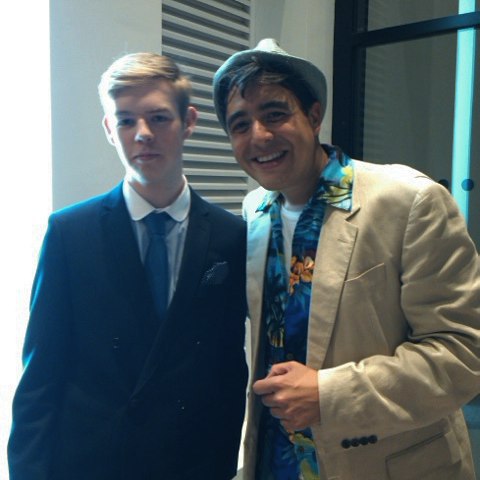
Young Critic James Briggs with cast member Noel Sullivan who plays Freddy Benson
Category Archives: Theatre
Review Barnum at Wales Millennium Centre, Cardiff by Barbara Michaels
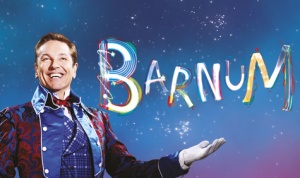
Barnum at Wales Millennium Centre, Cardiff
Book by Mark Bramble
Lyrics: Michael Stewart
Music: Cy Coleman
Reviewer: Barbara Michaels
Rating: 4.5
Jugglers, acrobats, gymnasts et al entertain as the audience takes their seats – latecomers miss a treat. Spectacle and excitement with dazzling displays of circus expertise – Barnum has them all. Based on the life of American showman Phineas Taylor (PT) Barnum who took his team of trapeze artists clowns, jugglers plus talented performers such as the singer Jenny Lind all over America and the major cities of the world, this is musical theatre traditional style given a new fillip by Cameron Mackintosh in this Chichester Festival Theatre production.
All the elements of the original Broadway production are here, but for those who were fortunate (or are old enough!) to have seen the production starring Michael Crawford which ran for a record-breaking 655 performances at the London Palladium after it opened in 1981, the big question must be: Does Brian Conley who is playing the demanding and exhausting role of showman PT Barnum live up to the almost-impossibly-high standard created by Crawford?
The answer has to be: Yes! Yes! And Yes! Conley’s Barnum is a likeable con man who could charm monkeys off trees – and does. Though when he forsakes his long-suffering wife Chairy, whose views differ radically from his as to what is right and what is not, siding with him becomes momentarily difficult. Even here, how can you feel anything but gut-wrenching suspense for a man who walks a tightrope to get to the temptation awaiting him on the other side in the shape of a delectable Swedish opera singer?? Metaphorically speaking, you say? No – in a daring act which took weeks to perfect, Conley actually does walk the tightrope. Indeed, throughout the show, along with the rest of the cast, he runs the gamut of acrobatic and dance skills with aplomb and style.
The bubbly Linzi Hateley more than holds her own as Chairy, the wife who despite brooking none of her circus-loving hubby’s nonsense, remains true to him till the end. The story of their marriage, with all its ups and downs, runs in perfect tandem with the on-going razzmatazz of the show, peppered with songs such as the foot-tapping ‘Come Follow the Band’ which opens Act I and Barnum’s theme song of ‘There Is A Sucker Born Ev’ry Minute’ plus the poignancy of ‘The Colors of My Life’ sung with feeling by Conley and Hateley, as is ‘So Little Time’ later, in Act II. If there is a criticism to be made – and in such a polished production it seems almost invidious to do so – it is that Kimberly Blake as opera star Jenny Lind, while looking stunning and ethereal in an ice blue creation that would not look out of place at the Oscars, is a tad too ethereal. The lack of chemistry between her and Barnum renders their love affair not entirely believable – a minor hiccup in an otherwise five star production.
A considerable chunk of credit for the fizzing excitement that characterises this high-energy show must go to the ensemble. On stage for most of the time, the acrobats, trapeze artistes, high wire experts and dancers never flag. Some neat cameo roles, too, from David Birch as an anxiety-ridden Wilton, while Edward Wade’s Julius Goldschmidt is a gem.
With great costumes and breath-taking staging – including a mock-up of the nether limbs of an elephant – this show is a firecracker.
Runs until Saturday August 15th
https://www.wmc.org.uk/Productions/2015-2016/DonaldGordonTheatre/Barnum/
Review Everyman Open Air Festival, As You Like It by Lois Arcari
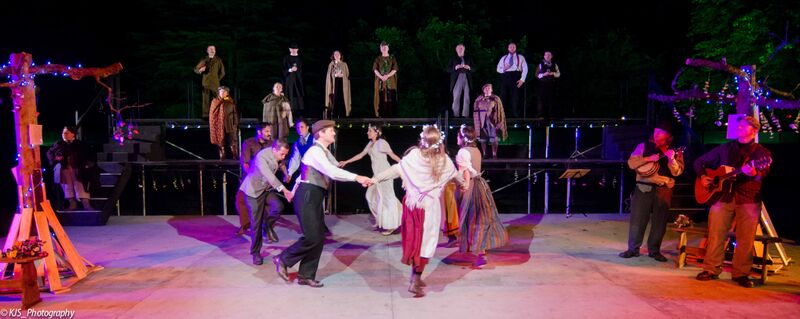
The music, folky and rustic was the backbone of the play, and was much like the play itself, pitch perfect, warm, and a crossing through time. As ever, the work on the stage was wonderful, the evening and the garden behind turning a sparse stage into a well made wood, the perfect stage for our characters to play on.
Rosalind was performed well, but shone as Ganymede, who it was obvious the actress relished playing, and did so with perfect comedic timing and a real chemistry with Orlando, who stole the audience in his wrestling scene.
Though the actresses in the parts were wonderful, there was little point turning the Duke’s into Duchesses, especially after the deliciously evil one disappeared from the play promptly and had nothing much to do.
Celia was played warmly and with wit, Pheobe and her lovelorn puppy were brilliant comically, and Touchstone was a very well-played fool, but nothing particularly new was brought to the play’s most famous phrase.
The folk songs gave a sense of real community, both to the fictional Forrest and to the audience, and, as said before, were probably the best and most memorable element of the play, with the wonderful happy ending a joy to behold for even the most cynical.
All in all, this was a play with a warm heart and brilliant players, and Sophia Gardens made the Forest of Arden come alive.
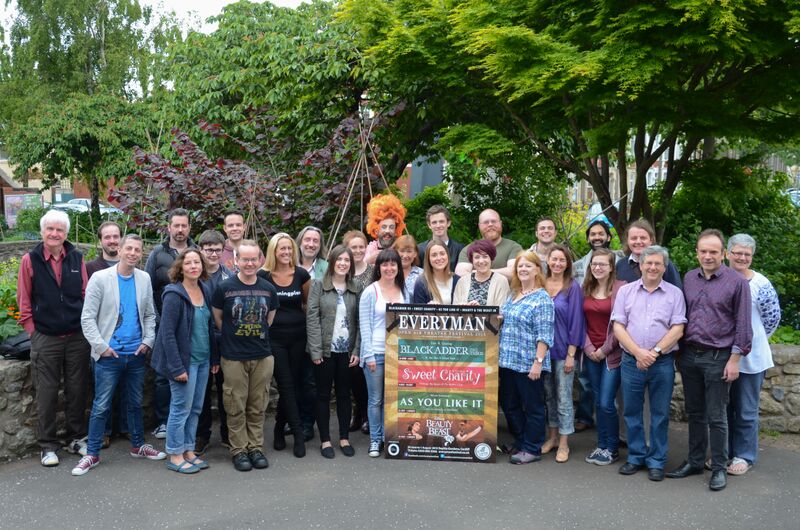
As You Like it runs until the 1st August
http://everymanfestival.co.uk/#/list
Review Jersey Boys, WMC by James Briggs
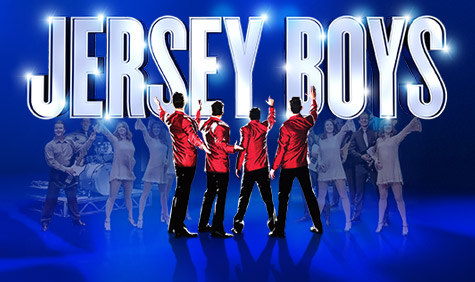
Frankie Valli and the Four Seasons have well and truly hit Cardiff!
Being only 16, I must admit I didn’t know what to expect when I agreed to review the musical “Jersey Boys” at Wales Millennium Centre last night having not really heard of Frankie Valli and the Four Seasons. However, I was not disappointed and I was surprised at how many smash hits Frankie Valli but more importantly Bob Gaudio had written that I actually knew.
The musical tells us how the band was formed and follows each member of the band on their incredible journey. The main character we follow is Frankie Valli who is guided by Tommy DeVito, who initially puts the band together and is Frankie’s mentor. Stephen Webb is intensely convincing as Tommy and plays the part exceptionally well. However, Tim Driesen provides an outstanding portrayal of the high pitched singing wonder that was Frankie Valli. The hugely talented composer Bob Gaudio is played by Sam Ferriday who later goes onto make a partnership with Frankie that would last for their entire careers and Lewis Griffiths plays the role of the deep voiced Nick very well.
Throughout the show you see the effect and pressures that the constant touring has on all their lives impacting on their relationships with their wives, children and each other and at times has a powerful impact especially when Frankie loses his daughter and the debt that Tommy DeVito gets into with his constant gambling and womanising which ends up with him being indebted to the Jersey mob.
However, the main reason why people will go to see this musical is because of the songs and they really do not disappoint! The band and cast are incredible and the show goes from one hit into another with songs such as Big Girls Don’t Cry, Can’t Take My Eyes Off You and Beggin’ you really are left with a feeling of ‘Oh What a Night’ we have just had!
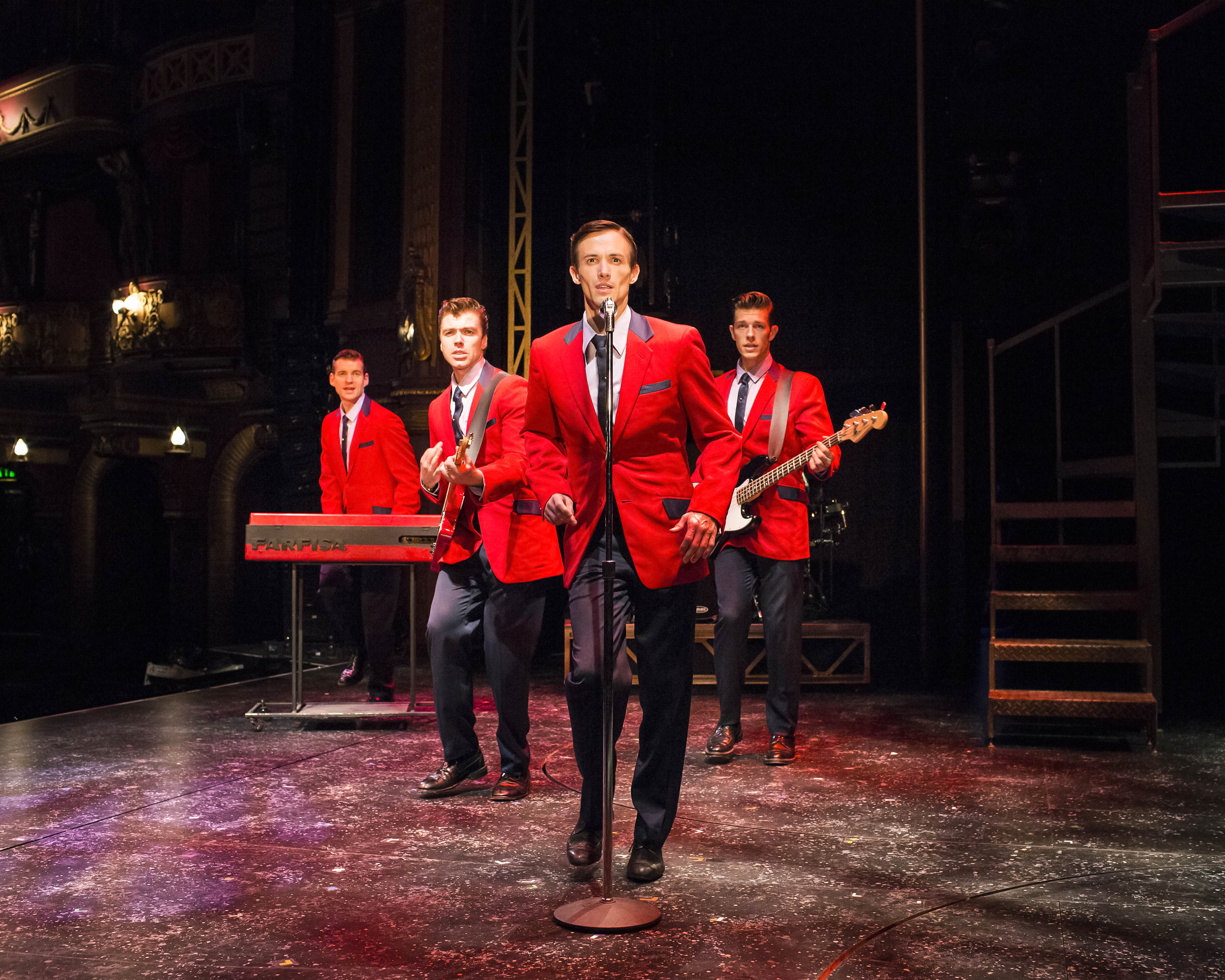
Overall, with the packed auditorium and everyone up and dancing on their feet we can safely say Cardiff will find it very difficult to say Bye Bye Baby, Baby Goodbye as they leave following their last performance on August the 1st. A thoroughly, enjoyable performance that everyone should see.
Jersey Boys is on at the Wales Millennium Centre from 21 Jul – 01 Aug 2015
https://www.wmc.org.uk/Productions/2015-2016/DonaldGordonTheatre/JerseyBoys/
Review Dracula Sherman Players by Becca Hobbs

Entering the Sherman Studio to pulsating music, you take your seat and look down into the pit where the cast are already in motion, rocking, twitching, sighing and gliding around with glazed expressions; the play’s preoccupation with madness is already apparent.
With an uncluttered set of different sized boxes used as the bed and grave, the setting (by designer Bethany Seddon and scenic carpenter Matthew Thomas) has a simplistic but eerie quality. In the most medicalised version of Dracula that I have seen, Liz Lockheed’s contemporary adaptation is a testimony of shared madness. With two characters playing one part, the body and the mind are split in two, actualising the medical discourse of the late nineteenth century by visualising a split personality on stage.
There is real psychological drive to the performance that is carried by the characterisation of Renfield (Luther Phillips/Nicky Howard-Kemp) and the asylum backdrop. Ainsleigh Barber also plays her part in creating the imaginative madhouse as a foul-mouthed nurse with a look of lunacy herself. To see Renfield as a character is interesting as the text always mentions him within Dr Seward’s journal entries but he has no voice. In Lochhead’s adaptation, he sits at the heart of the action, looking down on his cast, quoting poor Tom (the madman in King Lear) as if locked in a bird-cage munching on flies. His verse is poetic despite its jittery and schizophrenic nature and is sensitively interpreted by Luther Phillips and Nicky Howard-Kemp who are both particularly convincing. Having a male and female counterpart for the representation of madness is a fantastic idea.
As the sighs from the psychiatric patients become the sound of the train shooting down the tracks, the underlying technological movement from Bram Stoker’s text emerges and the sensual movement becomes systematic.
Set against Dracula’s predatory movement and the sexualised female ruby lips of Alys Wilcox, a lot of the characters – Harker (Finbar Varrel), Mina (Ruth Long/ Kirsty Campbell) and Florrie (Alice Muzzioli/Inari Soinila), a new addition to cast as the maid – are noticeably domesticated and the women are dressed in dirty white attire; Florrie with a baby on the way, and Mina and Harker unable to let go of the fact that the other was seduced by the darkness of vampirism. Stoker wrote his novel only a few years after Jack the Ripper and the sense of fear and use of protruding shadows aligned with the domestic snippets bring this production into the real world. Or so it seems until the madhouse is revisited again.
Alys Wilcox plays a seductive Dracula, eloquent but smouldering. Saskia Pay and Meg Lewis’ dual characterisation of Lucy is full of flirtation and gracefulness until the dramatically engaging transformation into frenzy during the nightmarish sleepwalking sequence where both girls are at their best. The whole cast works well together and aside from an occasional static line, it is clear that a lot of preparation has gone into the performance and the Sherman Players produce a very ambitious and interesting production.
The end, like the novel is anticlimactic. I was waiting was Van Helsing to appear above over Dracula’s body in a photo like shot holding the knife to sever the head, (especially after the camera played a great deal of significance), but that is a personal preference. Overall, the Sherman Players pulled off a very admirable first performance and the show is well worth a watch!
Wickedly innovative and full of conviction, this was a great start for the Sherman Players.
Performances are running at the Sherman Theatre until Saturday 25th July, 7.30p.m nightly.
http://www.shermancymru.co.uk/performance/theatre/dracula/
Review Double Dipp Date Night at The Sherman Theatre by Sarah Finch

“Love is blind…until you turn the lights on”
It’s Friday night, which means it’s Date Night!
On the 10th of July in the foyer area of The Sherman Theatre, my ‘date’ and I were asked to slap on a name tag and take a seat ready for an hour of comedy gold presented by Double Dipp! We mingled with the rest of the audience and before I could take any more in we were thrown into the mix of three dates; an inappropriate venue, speed dating and a couple trying to spice up their relationship.
Whilst the all too relatable subject matter of the performance kept the entire room laughing throughout, I felt it was the chemistry between actors, actors and audience that made the show. It was those moments that had those real, hilarious stomach cringing truths that either you or ‘someone you knew’ had been involved in and the perfect delivery that kept those laughs coming.
Double Dipp have managed to create a brilliantly timed show that starts with a bang and keeps that high paced energy going through until the end, from observing the audience I can safely say this was a massive hit especially with the older generation of viewers that I had anticipated would tut and frown as oppose to the raucous outbursts of laughing that they did.
Well done to the Double Dipp Team, Louisa Marie Lorey and Geraint Jones, your supporting cast and to Chelsey Gillard on your directorial debut! Comedy can be seen as a risky, hit or miss business but considering the loud applause and standing ovations received, people will definitely be waiting in anticipation for Double Dipp’s next bout of hilarity.
Catch Double Dipp’s debut show Pick n Mixx at the Edinburgh Fringe Festival 17th-22nd August.
Review Everyman Sweet Charity by Lois Arcari

Everyman have done it again; with a feel good, bubble-gum musical, with subtle intelligence and integrity in a candy wrapper.
Charity herself could verge into the territory of annoying with her relentless optimism, but the subtle grit of her allows for her buoyancy without ever giving the audience a cavity. Charity is played vivaciously, and her joy is as infectious as the songs. The big number, Big Spender was brilliant and brassy; a real crowd pleaser, to be honest every song was well delivered, and every dance expertly choreographed. The one weak note in the soundtrack, however, is one of the most well-known songs – while The Rhythm of Life is sung with as much power and passion as any of them, it didn’t seem as polished, and sometimes tripped over itself. By no means a bad song, it had moments of the trademark excellence, but felt mostly underwhelming. Still, the lesser known songs, and the entire soundtrack save that shone. The actor portraying Oscar had brilliant comedic timing, and won the audience over in his first appearance, while Charity’s best friends gave great supporting performances.
Overall, this was a real big winner of a show, whipping up a delight for the near packed audience.
Preview Date Night Double Dipp Sherman Cymru by Louise Apperley

Young Critic Louise Apperley was lucky enough to sit in on a preview of Date Night earlier this week at Sherman Cymru
The comedy Date Night is a light-hearted comedy which dives into the complexity of the characters and their humorous relationships in three different dating scenarios.
The scene is set as the three different date nights take place. Firstly the sleazy bar with crude entertainment (no place to take a lady). Secondly a very gay and very fabulous bar for very fabulous men looking for love, which I couldn’t ‘bear’ to finish. The final date is at a theatre where the play is so annoyingly contemporary that the couple of watching may be put off for a long time , as the story develops we find out that the husband may never want to leave his house again due to pure embarrassment. You need to watch it to find our more!
The set is cleverly thought out. All that we see are some chairs and a few props to create a fully functional set that successfully achieves the look of a date night. Three different locations are displayed through the world of the play allowing you to be immersed in’ the characters lives and hilarious relationships.
The comedy was an excellently performed, by a strong cast that worked well together. The brilliantly written dialogue with its quick and witty humour really carried this show. The characters pull the audience in, never really taking a serious tone, or if it ever did it was quickly shut down by the writers quick humour and the occasional faulty zipper! The comedy displayed really carried this show, I really wanted to learn more about these hilarious characters.
I would definitely recommend this play but maybe not to anyone who could get easily offended due to the threat of a faulty zipper!
Review Beneath the Streets: Lost and Found Hijinx & Punchdrunk Enrichment by Sarah Finch
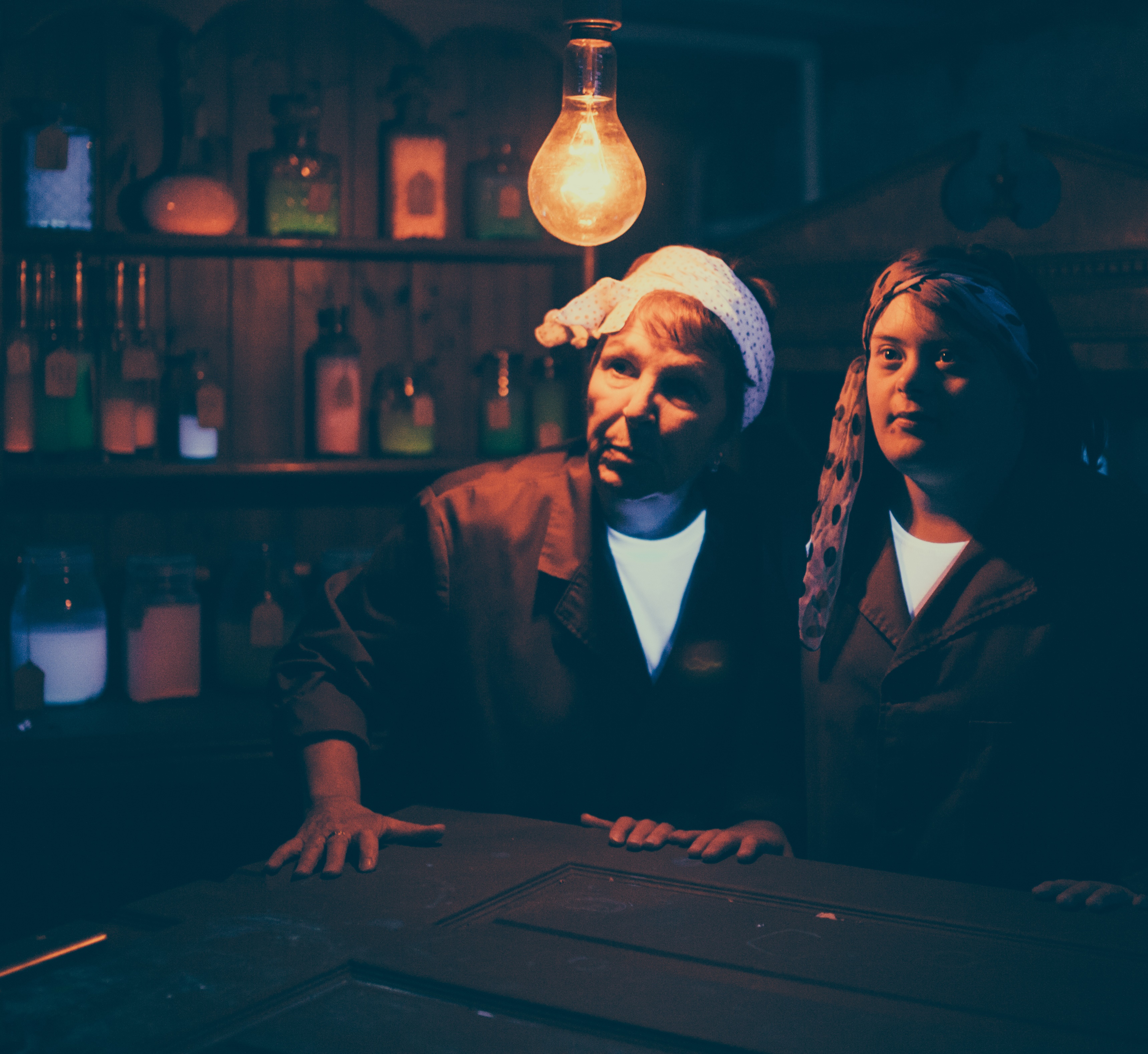
Before starting this review I would like to congratulate the collaborators Hijinx and Punchdrunk Enrichment on arguably the most incredible and engaging immersive, site specific performance that I have ever had the pleasure of participating in, a bold statement that I hope this review provides justification for.
“We’ve all lost something: glasses, keys, memories, love, loved ones, our way…Are these things gone forever or have they found a home elsewhere? Hidden in Cardiff is a world of lost things. In the shadows, behind closed doors, we await you”
On Wednesday the 1st of July I joined a steadily growing queue outside the Maldron Hotel in Cardiff to see Beneath The Streets: Lost and Found. An exciting buzz of anticipation was rippling through the audience and before long a briefing on what was to come was delivered, along with mandatory dust masks. The buzz was now turning into excited curiosity as we were led to the front doors of Jacob’s Antiques Market.
Upon entering the space I was immediately drawn to the attention of detail that had been used. Given that I am familiar with the regular layout of Jacob’s Antiques Market I was extremely impressed with how the design team and stage carpenter had utilised the space given to create this incredibly beautiful maze spanning two floors. I will admit I had trouble finding my way around for the first 15 minutes. Everywhere you went you were met with a corner, a drape or darkness! Opening doors to nothingness, dim lighting that cast shadows over performers and beautiful decorations adorning different sections of this new world.
My particular favourite was a pyramid made from pages and pages of books in the section of lost words, the impressive set design continued as I found myself being led by an actor into a dark room lit with a few candles, to be told a tragic love story, only to find him conversing through a non-existent mirror with his lady-love. An extremely clever trick that left myself and the other audience member, that had been lured to the ‘other room’, in complete shock. Upon discovery of the lower lair I came across sets of actors telling different stories, all looking for something or finding something. Ascending to the upper we were greeted with corporate scenes, scientists, products, offices and even a small exhibition. Eventually a message sounded over the tannoy asking that all staff report to a meeting on the upper level, the audience then witnessed the delivering of an elixir which had side effects on every staff member. The staff began to engage with the audience, but in a different way than before – this was then our signal to be led out.
I feel that words simply cannot describe how beautiful, thought-provoking and magical the experience was. Every actor was superb, it was inspiring to see the relationships between characters and the chemistry felt in each situation, credit is due to all that participated. The set and costume designs were outstanding and considering how much effort had gone into stage production I felt this really complimented the actors and helped to bring the performance to life.
As an actor that has performed in immersive theatre I applaud with admiration each and everyone that performed in this flawless production, immersive theatre is the most exciting of theatre forms that I hope all actors enjoyed delivering to their audience. With the element of lost and found I can speak from personal experience when agreeing that I did lose myself here because I was so completely engaged with this perfect production, I will definitely be the first in line for tickets when Hijinx and Punchdrunk Enrichment honour the people of Cardiff with another outstanding show.
Review Dial M for Murder Alfred Hitchcock, Chapter Arts Centre by James Knight
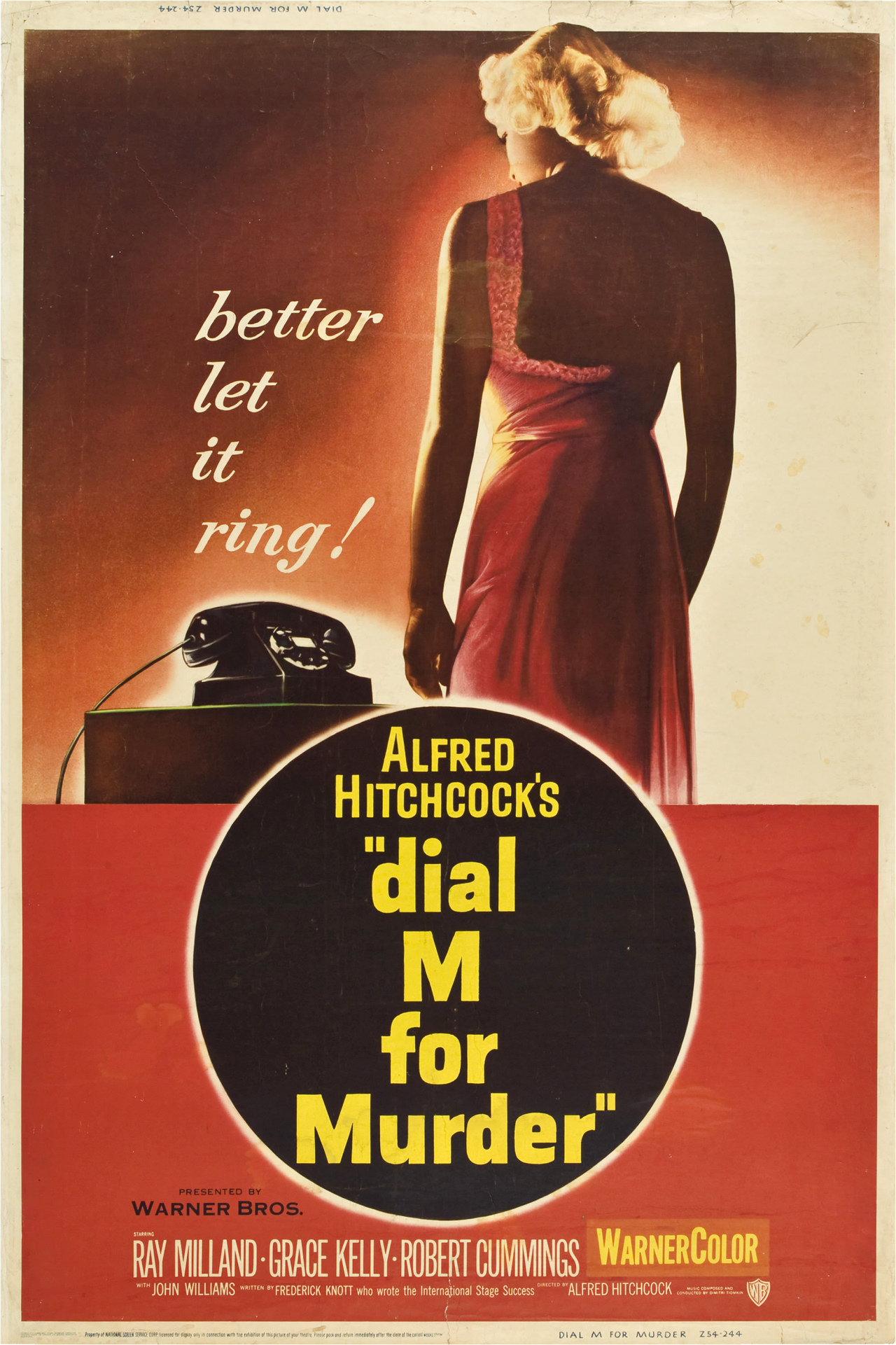
Dial M for Murder, directed by Alfred Hitchcock, one of cinema’s great misanthropes, is playing this week at Chapter Arts Centre. Playing as part of the “Ray Milland Season”, Milland born Reginald Truscott-Jones in Neath, took the name Milland after Neath’s Milland Road, which is now an industrial site come train station car park, oh the Hollywood romance.
Tony Wendice (Ray Milland) a former tennis pro, blackmails an old university chum into murdering his cheating wife Margot. Grace Kelly plays the wife (notice how she first appears in the reddest of rouge dresses, blood and murder are immediately on the mind, notice actually how the colour red is used throughout to denote blood, Hitchcock manages to make a bloody film without any blood), whilst Robert Cummings plays American crime writer Mark Halliday, the man Margot has been carrying on with. The film is an intriguingly complex viewing experience; we want Milland to succeed yet Kelly to survive, we want Milland to be caught but would also revel in his escape, we want Kelly and Cummings to run off together yet we want Milland and Kelly to live happily ever after.
There are at least three reasons to see Dial M for Murder. Firstly, for Grace Kelly, for her tenderness, for her beauty, for her movie stardom, no one photographed her as brilliantly as Hitchcock, see Rear Window for the most beautiful close-up in cinema as she leans in to kiss Jimmy Stewart. Secondly, for Ray Milland, for the devil in his movie star blue eyes and the charisma to his dark scheming murdering plans. Finally, for Hitch himself, for his genius. Primarily for his combination of camera movement and montage, his masterful use of close-ups and inserts, how through a simple close-up of Milland’s hand he manages to convey all the film’s psychology and terror. There are two moments of obvious brilliance in the film, one where Hitchcock films Milland planning the murder from above with a bird’s eye camera, making it all seem like a deadly game of human chess, and secondly a one shot of Kelly as she makes a court appearance which is a sequence of pure visual artistry. Also be on the lookout for Hitchcock’s comedic touches which often go unnoticed in many of his pictures, most notably here in John William’s performance as the Chief Inspector. Lookout for his moustache twirls, his crumpled raincoat, the way he wrestles with Robert Cummings over Milland’s bank statements, but the most brilliant example of Hitchcock black comedy can be found in the little detail of who hands Grace Kelly the now infamous pair of scissors.
Dial M for Murder is a film that gets richer with each viewing. It’s pure Hitchcock which means that it’s pure cinema.
Dial M for Murder (PG)
USA/1954/101mins/PG. Dir: Alfred Hitchcock. With: Ray Milland, Grace Kelly, Robert Cummings
At Chapter Art Centre
– See more at: http://www.chapter.org/dial-m-murderpg#sthash.18HADZga.dpuf
Tuesday July 7th – 2:30pm
